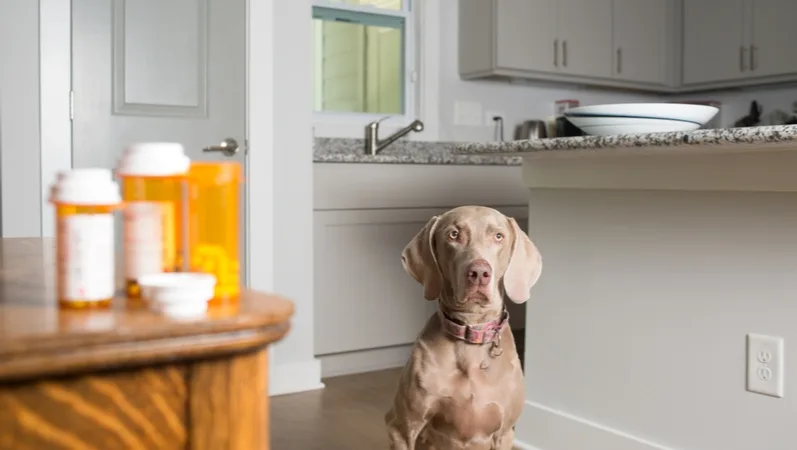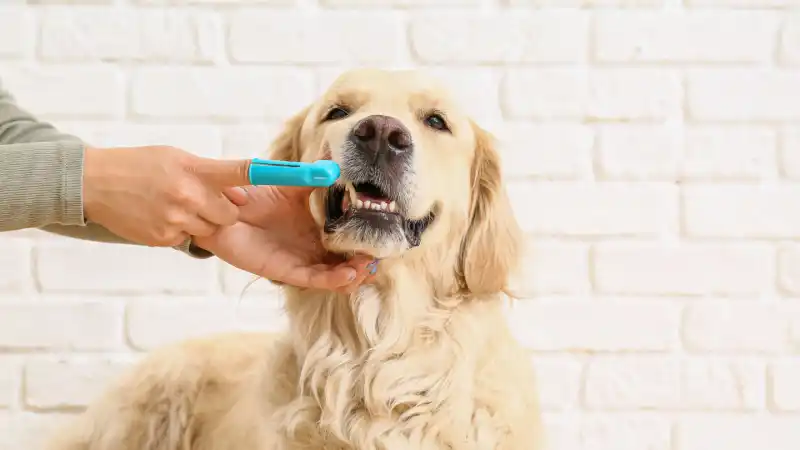Human Medications Fatal to Pets: How to Keep them Safe
Human medication poisons more pets than any other household toxin. Learn the most dangerous drugs and what to do if your dog or cat eats the wrong pill.

Did you know that human over-the-counter (OTC) and prescription medications harm more pets than any other household toxins? That's right. According to the ASPCA Animal Poison Control Center (APCC), human medications topped the list of poison concerns for pets in 2020. But which types of human medications are the most dangerous for pets? And what can you do to protect your furry friends? Keep on reading to find out.
Which Human Medications Are the Most Dangerous for Pets?
Many commonly used human medications are highly toxic to pets and can cause serious illness or even death if ingested. Let's take a look at some human OTC and prescription medications that you need to be particularly careful with around your pets.
Over-the-Counter Medications
The following common OTC medications are toxic to pets and should be kept out of their reach at all times:
**5-Hydroxytryptophan (5-HTP)**is an OTC supplement that's often used to treat depression, anxiety, and insomnia. If ingested, it can cause serious neurological problems in pets, including seizures and tremors.
Acetaminophenis a very common ingredient in human OTC pain and fever reducers, such as Tylenol and Feverall. When ingested by pets, acetaminophen can cause serious health issues, including liver damage and anemia.
Although aspirin is sometimes prescribed to pets, it's also highly toxic when given in the wrong dosage. Ingesting aspirin can cause stomach ulcers, kidney failure, and other serious health issues in pets.
Ibuprofenis a popular OTC medication sold under brand names such as Advil, Motrin, and Nuprin. This nonsteroidal anti-inflammatory drug (NSAID) can cause serious gastrointestinal issues, seizures, and even death in cats and dogs.
Naproxenis another OTC NSAID that can be found in medications such as Aleve. It can cause symptoms like vomiting, abdominal pain, and bleeding when ingested by pets.
Pseudoephedrineis the main ingredient in many OTC decongestants and cold medications, including Sudafed. When ingested, pseudoephedrine can be deadly to pets. Symptoms of poisoning include agitation, tremors, and dilated pupils.
Human Prescription Medications
Many human prescription medications can also cause serious health issues for pets, including:
Adderallis a prescription medication used to treat attention deficit hyperactivity disorder (ADHD). Like many drugs used to treat the condition, Adderall contains amphetamines, which can cause tremors and seizures in pets.
Albuterolis a common medication used to treat asthma in humans. When ingested by pets, it can cause dangerous symptoms, including increased heart rate, excessive thirst, agitation, and weakness.
Baclofenis a prescription muscle relaxant. It's also one of the deadliest pet toxins, according to the ASPCA. Symptoms of baclofen poisoning in pets include muscle tremors, seizures, and coma.
Calcium channel blockersare a type of medication used to treat high blood pressure, angina (chest pain), and other heart conditions. When ingested by pets, these drugs can cause serious heart problems, including arrhythmia and heart failure.
Also known as valium, diazepam has a sedative effect on animals that makes them very sleepy or even unresponsive. In severe cases, ingestion of diazepam can lead to respiratory and cardiovascular depression, which can be fatal.
Alprazolam(the active ingredient in Xanax) is a benzodiazepine that causes drowsiness, lethargy, and sedation in pets. Other signs of toxicity include nausea, vomiting, and lack of coordination. Just like diazepam, high doses of Xanax can lead to respiratory and cardiovascular depression.
What to Do If Your Pet Ingests Human Medication
The medications listed above are just some of the most common human drugs that are dangerous to pets. Please visit the ASPCA's website for more information about human medications and their effects on pets.
If you think your pet has ingested human medication, contact your veterinarian or the ASPCA Animal Poison Control Center at (888) 426-4435 immediately. They'll be able to advise you on the best course of action, based on the type and amount of medication ingested.
In some cases, your vet may be able to induce vomiting in order to remove the medication from the pet's system. Other treatments for overdose and toxicity may include activated charcoal if the drug has been absorbed by your pet's body, and intravenous fluids to combat dehydration and treat shock.
If possible, save the medication container or bottle and bring it with you when you take your pet to the vet. This will help them determine which drug was ingested and how much was taken. In addition, try to provide your vet or the ASPCA Animal Poison Control Center with as much information as possible about your pet's health and behavior before, during, and after taking the medication.
How to Protect Your Pets from Human Medications
The best way to protect your pets from human medication poisoning is to keep them out of reach. Place all medications, both prescription and OTC, in a secure place where your pets can't get to them. Remember, medications left out on tables, countertops, and nightstands are easy targets for pets. That's why it's best to store all medications in a lockable cabinet or drawer.
If you keep medications in your bag or purse, be sure to keep it zipped closed and stored in a place where your pet can't get to it. In addition, always keep track of your medications. If you know your pet's around, try to avoid taking medication in front of them or leaving the bottle unattended.
Never give human medications to pets unless directed by your veterinarian. It's also important to keep in mind that just because a medication is safe for people, that doesn't mean it's safe for pets. So, if you're ever unsure about whether or not a medication is safe for your pet, contact your veterinarian or the ASPCA Animal Poison Control Center.
The bottom line? Always be vigilant about keeping human medications away from your pets and contact your veterinarian or the ASPCA Animal Poison Control Center immediately if you think your pet has ingested them.
Also, it's always best to be prepared for vet visits related to unexpected accidents and illnesses. AKC Pet Insurance (underwritten by Independence American Insurance Company) plans offer coverage for toxin ingestion and many other common canine emergencies. Click here to create a custom plan fit for your dog and budget.

Richard has shared his life with pets since childhood, and currently has a rescue cat and dog. He works with veterinarians and pet businesses to improve their content. To find out more, please visit his [website](https://richardrowlands.com/).
READ MORE ARTICLES

